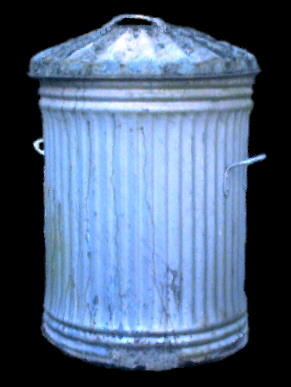"Is This Your First Time, You Know, Being Green?"
It was just a short slip down the greenie slope from there, brother, to bigger and more earnest sustainable practices. Walking and biking places, buying organic; installing solar cells. Recycling seemed so innocent, and kind of helpful, you know -- until the day we realized we were hooked. It was just a simple little thing right? Not like eating organic granola with a Redwood tree for company, right?
Don't you believe it. Recycling is a classic gateway practice. What starts out as a simple "Reduce, Reuse, Recycle" commitment is so easy, so seductive, that before you realize what’s happened the idea of putting a recyclable product into the landfill can make you break out in a cold sweat.
Yep. For us it all started with recycling.
“You Know, When I Was Your Age We Didn't Even Have Recycling”
See, back in
 the old days it all went into the trash -- except the soda bottles. We saved those and took them to the store to get the deposit back. Kind of like airport shopping carts nowadays. You just rented the bottle to carry your soft-drink home, and then you gave it back. The deposit -- real money in those days -- was there to make sure you did bring the bottle back, 'cause the drink-makers were going to refill it (or so we believed). And of course, every so often a school would have a newspaper drive fundraiser, and sell a truck load of newspaper back to the paper mill. Nobody thought it was important.
the old days it all went into the trash -- except the soda bottles. We saved those and took them to the store to get the deposit back. Kind of like airport shopping carts nowadays. You just rented the bottle to carry your soft-drink home, and then you gave it back. The deposit -- real money in those days -- was there to make sure you did bring the bottle back, 'cause the drink-makers were going to refill it (or so we believed). And of course, every so often a school would have a newspaper drive fundraiser, and sell a truck load of newspaper back to the paper mill. Nobody thought it was important.Then Earth Day hit, and the 1970's, and in 1972 the Boy Scouts of all folks started Project SOAR (Save Our American Resources) and the organization that now has a bad reputation as a training ground for the political right promoted conservation, something called ecology, and God help 'em, recycling.
Recycling and -- honest to goodness -- not using colored toilet paper anymore, because it hurt the goldfish in our classroom experiment.
For a long time recycling was a voluntary, feel-good, hippie commune or Boy-Scout-service-project sort of activity.
Somewhere on the way to the 1990s someone figured out that cities could get peo
 ple to put all their recyclable stuff in a special box, and that cities could collect the stuff, process it, and maybe make a little cash out of it. Oh, and not incidentally reduce the amount going into the landfill. Which saved some more money. So a few cities did.
ple to put all their recyclable stuff in a special box, and that cities could collect the stuff, process it, and maybe make a little cash out of it. Oh, and not incidentally reduce the amount going into the landfill. Which saved some more money. So a few cities did.'Course, it was just glass, metal and paper then. Plastic was definitely not recyclable.
Then the State of California noticed that the landfills were filling up -- all the way up -- and that there was not so much room anymore for the Golden State's tarnished discards.
California to Cities: "Less Trash, Or Else"
Not knowing what else to do, the State of California passed a law requiring cities to cut their trash-stash in half. Fifty percent reduction, or else; and that meant fines, big ones, $10,000-a day-big for failure to reduce the waste flow.
So: Remember those recyclin' cities? They already had these tiny recycle boxes going out to sit beside the regular trash already, right? So somebody did a little research and discovered that people still weren't recycling nearly all the spaghetti sauce jars and cardboard cereal boxes that they could -- and so the cities went to town and implemented recycling in a big way.
Now there are lots of ways to do recycling. Over the years, though, these have evolved into The Good Way, The Bad Way, and The Hard Way.
Turns out The Good Way had side benefits people didn't expect when they first started massive city-wide recycling programs. Turns out, The Good Way gets people thinking.
Of course, these days in many American cities, every first and second-grader understands that it is better to reuse something than to use up more of a limited resource; that certain materials can be reused and should be returned to the stream of commerce, not buried for a thousand years; that recycling is cool.
Not knowing what else to do, the State of California passed a law requiring cities to cut their trash-stash in half. Fifty percent reduction, or else; and that meant fines, big ones, $10,000-a day-big for failure to reduce the waste flow.
So: Remember those recyclin' cities? They already had these tiny recycle boxes going out to sit beside the regular trash already, right? So somebody did a little research and discovered that people still weren't recycling nearly all the spaghetti sauce jars and cardboard cereal boxes that they could -- and so the cities went to town and implemented recycling in a big way.
Now there are lots of ways to do recycling. Over the years, though, these have evolved into The Good Way, The Bad Way, and The Hard Way.
Turns out The Good Way had side benefits people didn't expect when they first started massive city-wide recycling programs. Turns out, The Good Way gets people thinking.
Of course, these days in many American cities, every first and second-grader understands that it is better to reuse something than to use up more of a limited resource; that certain materials can be reused and should be returned to the stream of commerce, not buried for a thousand years; that recycling is cool.
But making it easy to do -- that's another question.
Coming Up Next:

2 comments:
Just happened to be browsing random blogs and came across yours. Great idea and a promising start, Roger!
Regarding your upcoming post about how cities handle recycling, I live in Boston and it's quite easy to recycle here. The city gives out blue boxes where you put glass, plastic and cardboard. Newspapers and ads go into a paper bag. Then you simply put them on the roadside on trash day.
That said, recycling isn't popular on my street. 30 houses, 3 blue boxes. Lack of advocacy, I think, since recycling isn't difficult. Once you do it for a while it becomes second nature; a glass jar simply doesn't belong to a trash bag. Your spine does the "thinking" for you and tells your hand to drop it in the blue box.
I'd love to hear about solar power if you decide to experiment with it. Good luck!
Thanks for the kind words!
Have now posted Part II and III, and I think you will find your motivation factor in Part II. Hint: Follow the $$$.
Here in Pasadena we used to do exactly as you have described, but refined it into the Pay As You Throw system . . .
As for solar, we did it last February, and we plan to share our installation experience here . . . Teaser: Solar Cells can work well over 100% of their rating in cold weather, so long as the snow is cleared off. The trick is a STEEP angle (which would help with the snow) to track the sun's winter path. We pull 30-40% more power off our roof on any given sunny day in winter rather than summer (grin)
Post a Comment